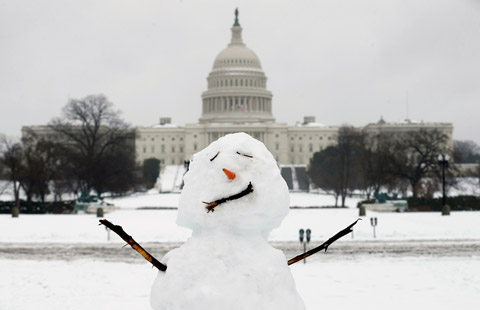Chinese affiliates of ‘Big 4’ look to overturn ban
Updated: 2014-02-12 09:21
By MICHAEL BARRISin New York (China Daily USA)
|
||||||||
Chinese affiliates of the Big Four accounting firms are looking to get the US Securities and Exchange Commission to overturn a judge's six-month accounting ban over the firms' refusal to cooperate with an accounting fraud investigation, a source familiar with the case told China Daily.
The firms were expected to file their appeal on Tuesday, according to the source who asked not to be identified.
The ban would force more than 200 Chinese companies traded in the US to find new auditors, while multinational corporations with significant operations in China would also have to bring in new firms to check those units. If the SEC upholds the judge's decision, the firms could ask the US Court of Appeals in Washington to overturn it.
Last month, China had warned the US of "consequences" that could hurt diplomatic relations between the world's two largest economies if the SEC confirmed Administrative Law Judge Cameron Elliot's Jan 22 decision to suspend the Chinese affiliates of PricewaterhouseCoopers, Deloitte Touche Tohmatsu, KPMG and Ernst Young from auditing US-listed companies.
The ban stemmed from the Chinese affiliates' refusal to give the SEC documents about some of their US-listed Chinese audit clients to help the commission investigate the companies for possible accounting fraud.
The firms argued they were trapped between US law, which requires them to hand over any documents regulators request, and Chinese law, which prohibits transferring data that might contain state secrets to foreign parties. The firms announced their intention to appeal, soon after the decision was handed down.
Responding to the ban, China's securities body, the China Regulatory Commission, accused the SEC of ignoring progress China had made on cross-border regulatory cooperation. "We hope the SEC will take into consideration the big picture of China-US regulatory cooperation, make the right judgment to resolve the situation properly," the CSRC had said on its microblog. "The SEC should bear all responsibility to possible consequences arising from the decision."
The SEC had filed an administrative action against the auditors in 2012 after fighting for years to obtain information for dozens of accounting fraud probes at China-based companies.
Daniel O'Connor, a partner at the Ropes & Gray law firm in Boston said "everyone recognizes there's a need for a practical solution. Whether that means they back off from the administrative law judge's decision or not remains up for grabs," he was quoted by Bloomberg News.
Meanwhile, US and Chinese regulators have been trying to resolve some of the legal obstacles that auditors said blocked their co-operation with the SEC investigation. Jim Doty, chairman of the Public Company Accounting Oversight Board, the top US audit watchdog, said he is optimistic the two sides will be able this year to reach an agreement to inspect the audit work of firms registered with it but based in China.
A compromise could be struck by giving the PCAOB access to work papers or allowing it to meet with auditors outside China, Doty told the SEC. An agreement in May between the two countries allowed some cooperation, and US regulators have received documents on at least four companies, the Chinese securities regulator said last month. That agreement didn't allow for the PCAOB to inspect audit firms in China.
Doty said the Chinese regulator and the PCAOB are still exchanging draft agreements and have not yet decided how the inspections would be conducted. Because Chinese negotiators are reluctant for the inspections to be conducted on Chinese soil, the papers might have to be moved to a foreign territory for inspection.
"It could be they would allow PCAOB inspectors into the country, either with Chinese counterparts or alone," said Joseph Carcello, an accounting professor at the University of Tennessee. "But in an enforcement case, in order for the SEC to be able to meaningfully investigate and prosecute a case, they would need the papers in the US," Carcello told Bloomberg News.
The scandals that led to the cross-border regulatory dispute produced a chilly US investment climate for Chinese stocks –— even for those whose accounting practices were above board. Aggressive scrutiny of Chinese companies by US short-sellers such as the Muddy Waters research firm caused share prices of US listed Chinese companies to plunge, new capital flows to dry up and dozens of Chinese firms to desert the US stock market.
The Bloomberg China-US Equity Index of the most-traded Chinese stocks in the US has dropped 6.9 percent since the judge's initial decision, compared with a 1.7 percent increase in the Shanghai Composite Index and a 2.4 percent drop in the S&P 500.
Late last year, US investors again began showing interest in Chinese companies already listed or seeking to list on US exchanges. Eight Chinese companies had initial public offerings in the US last year, up from three in 2012. Alibaba Group Holding Ltd., China's largest e-commerce company, said in November that it was deciding whether to sell shares in the US or Hong Kong.
The list of Chinese companies seeking to trade on the US stock market in 2014 includes JD.com Inc, China's second-biggest e-commerce firm after Alibaba. JD said last month it aims to raise $1.5 billion in what may be the second-biggest US IPO by a Chinese company.
More than 140 Chinese companies have raised $36.6 billion through US IPOs since 2000, according to Thomson Reuters data.
Contact the writer at michaelbarris@chinadailyusa.com

 World's largest freshwater lake frozen
World's largest freshwater lake frozen
 American photographer wins World Press Photo 2013
American photographer wins World Press Photo 2013
 Zhou Yang retains women's 1500m title
Zhou Yang retains women's 1500m title
 Renzi set to become Italy's youngest PM
Renzi set to become Italy's youngest PM
 Kissing contest celebrates Valentine's Day in Beijing
Kissing contest celebrates Valentine's Day in Beijing
 Xinjiang quake damage could have been worse
Xinjiang quake damage could have been worse
 US East Coast buried in snow
US East Coast buried in snow
 China's Li wins women's 500m gold
China's Li wins women's 500m gold
Most Viewed
Editor's Picks

|

|

|

|

|

|
Today's Top News
Dallas shooting kills one, injures six
High-rise security tightened after stunt
Shelters reveal flaws in child welfare
Precipitation expected to clear up smog-filled skies
Police reveal details of Xinjiang terrorist attack
Canadian immigration changes called unfair
Finding real wealth in health industry
Courts try to improve efficiency
US Weekly

|

|





